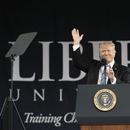Comey Firing Aftermath; Ransomware Attack; the Poetry of Pop
Coming up on today’s show:
- The Takeaway lays out a timeline of the conflicting statements and lies emerging from President Trump and the White House surrounding the firing of FBI Director James Comey and the ongoing investigation into possible collusion between Trump and Russia during the campaign. Michael Shear, a reporter for the New York Times, joins guest host Todd Zwillich.
- The massive ransomware attack that hit computer systems across the globe on Friday has been called the biggest ever. Targeting hospitals, telecommunications agencies, and government departments in 99 different countries, it was a reminder of how vulnerable many of the most essential parts of society are to digital viruses. Nuala O’Connor, the president and CEO of the Center for Democracy and Technology and former Chief Privacy Officer for the Department of Homeland Security, weighs in.
- Smallpox was one of the deadliest diseases in human history, killing up to an estimated half-billion people in the 20th century alone. The World Health Organization undertook a massive eradication campaign in the 1970s, and officially declared the end of smallpox in 1979. That story and what we can learn from it is the subject of the latest dispatch from our friends at the Retro Report. Umbreen Butt, a producer for Ikana Media and a freelance producer on the documentary, joins us to discuss.
- Earlier this month, Baltimore Orioles All-Star Adam Jones was in the outfield during a game at Fenway Park, when a Red Sox fan hurled a bag of peanuts at him, yelling racial slurs. A similar incident occurred the next day, this time directed at the woman singing the national anthem. Dave Zirin, sports editor for The Nation magazine and host of “The Edge of Sports” podcast, says the history of racism in Boston sports goes back decades.
- KERA’s ongoing One Crisis Away project looks at life on the financial edge. In their latest series, “No Place To Go,” they’re exploring West Dallas, across the Trinity River from downtown. Since the city built a new bridge, upscale shops, restaurants and apartment buildings have moved in, changing the neighborhood. Now hundreds of residents — who’ve lived in West Dallas for generations — have to move. Courtney Collins, a reporter for KERA, has the story.
Whether it’s the Beatles or the Stones in the 60s, Devo in the 80s, Tupac in the 90s, or Rihanna today, pop music forms the soundtrack of our lives and generations. But we have a tendency to think of these songs as simply fun rather than meaningful. A new book called “The Poetry of Pop” argues that we should change our tune. Author Adam Bradley, who’s also the founding director of the Laboratory for Race and Popular Culture at the University of Colorado, discusses how the history of pop music is closely tied to poetry itself.
Sign up for our daily newsletter
